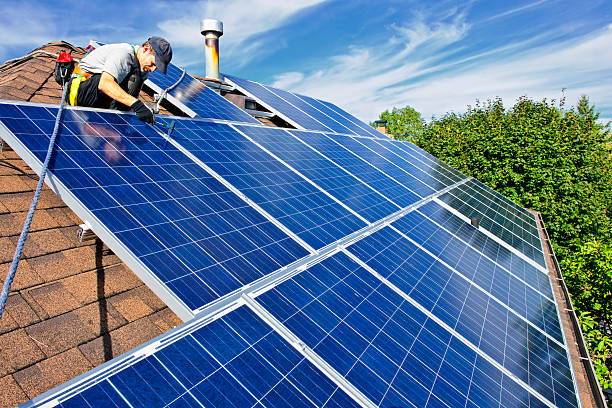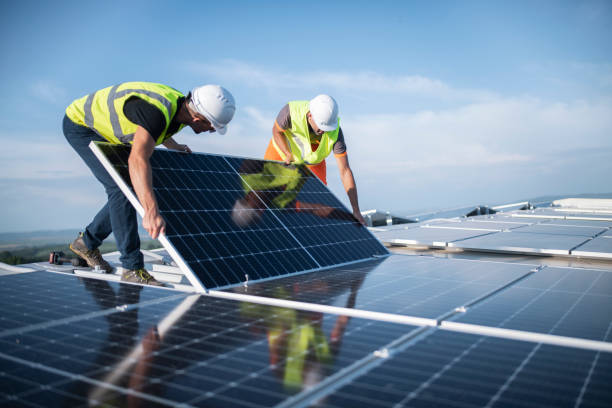Solar energy is rapidly gaining traction as a leading renewable energy source. As more homeowners and businesses consider solar panel installation, the process of choosing the right system and design for optimal efficiency has become essential. If you’re in Iselin, NJ, and considering solar panel installation, here’s everything you need to know—from initial design considerations to installation and maintenance tips.
Contents
1. Why Go Solar in Iselin, NJ?2. Understanding Solar Panel Design Basics3. Types of Solar Panels Available in Iselin4. Selecting a Reliable Solar Installer in Iselin, NJ5. The Solar Installation Process6. Solar Incentives for Iselin, NJ Residents7. Maintenance Tips for Solar Panels8. The Long-Term Benefits of Solar Energy9. Is Solar Right for You?Conclusion
1. Why Go Solar in Iselin, NJ?
Iselin, NJ, like much of the Northeast, has seen a strong push toward clean energy. Solar energy is an ideal solution, especially as the state offers incentives for those adopting renewable sources. Here are some key benefits of installing solar panels in Iselin:- Reduced Energy Bills: Solar energy can significantly lower monthly energy costs, providing relief from rising electricity prices.
- Environmental Impact: Solar energy is a green power source, reducing the carbon footprint and supporting sustainability.
- Incentives and Rebates: New Jersey offers various state incentives and tax credits to make solar more affordable.
- Increase in Property Value: Solar panels can increase property value, making it a smart investment.
2. Understanding Solar Panel Design Basics
The design of your solar panel system is a critical aspect that impacts energy efficiency and aesthetics. Here’s what you need to consider when planning your system in Iselin:- Energy Needs Assessment: Calculate your home or business’s energy consumption. This will help determine the size and number of panels required to meet your energy goals.
- Panel Placement and Tilt: In Iselin, optimal sunlight is crucial. Panels are usually installed on south-facing roofs with an angle that matches the latitude for maximum sun exposure.
- Roof Space and Condition: The layout and size of your roof will determine panel placement. Solar installers will inspect the roof to ensure it can support the weight of solar panels.
- Shade and Obstructions: Trees, buildings, or other structures may cast shadows, affecting panel efficiency. Strategically designing around these obstructions is vital to maximize energy production.
3. Types of Solar Panels Available in Iselin
There are three primary types of solar panels to consider for installation in Iselin:- Monocrystalline Panels: Known for high efficiency and durability, monocrystalline panels are suitable for limited roof space and provide higher energy output.
- Polycrystalline Panels: While slightly less efficient than monocrystalline, polycrystalline panels are cost-effective and perform well in ample space conditions.
- Thin-Film Panels: Lightweight and flexible, thin-film panels are less efficient but may be ideal for specific applications or aesthetic needs.

4. Selecting a Reliable Solar Installer in Iselin, NJ
Choosing a reputable solar installer is essential to a successful solar installation. When selecting a provider in Iselin, look for:- Experience and Certification: Choose an installer with experience in residential or commercial installations, as applicable, and ensure they have NABCEP (North American Board of Certified Energy Practitioners) certification.
- Local Knowledge: Local companies are familiar with New Jersey’s climate, policies, and incentives. They can navigate these efficiently and provide designs suited to local conditions.
- Customer Reviews and Portfolio: Look at customer testimonials and request portfolios of previous projects to gauge their quality of work and service.
5. The Solar Installation Process
The installation process is generally smooth but requires careful planning and multiple stages:- Site Evaluation and Consultation: This first step involves assessing the site to determine feasibility, the system’s size, and design considerations.
- Design and Permitting: Once the design is finalized, the installer will submit the necessary permits to the local government in Iselin. The permitting process ensures that the system complies with zoning, building, and electrical codes.
- Installation: Installation includes mounting the panels on the roof, connecting inverters, and wiring the system to ensure proper energy flow.
- Inspection and Activation: After installation, an inspection ensures everything is up to code. Once approved, the system can be activated, and you can start enjoying solar energy.
6. Solar Incentives for Iselin, NJ Residents
New Jersey provides several financial incentives to encourage residents and businesses to adopt solar power. These include:- Solar Renewable Energy Certificates (SRECs): SRECs allow you to earn credits for each megawatt-hour of solar energy produced. These credits can be sold, generating additional income.
- Federal Solar Tax Credit (ITC): This federal program offers a 30% tax credit for the cost of solar installations, helping to offset upfront expenses.
- NJ Clean Energy Program: New Jersey’s Clean Energy Program provides rebates and incentives for residential and commercial solar installations, reducing overall costs.
7. Maintenance Tips for Solar Panels
Solar panels require minimal maintenance, but regular upkeep ensures maximum efficiency. Here’s what you can do:- Regular Cleaning: Dust, leaves, and debris can accumulate, affecting performance. A soft brush or low-pressure hose can be used to clean panels.
- Monitoring Performance: Track your energy output using monitoring software. Any decrease in performance can signal the need for maintenance.
- Annual Inspections: Schedule annual inspections with your installer to check for potential issues like loose wiring or cracks.
8. The Long-Term Benefits of Solar Energy
Going solar is an investment that pays off in multiple ways:- Lower Utility Bills: A well-designed solar system can cover a significant portion of your energy needs, saving on monthly bills.
- Energy Independence: Solar panels allow you to generate your own electricity, making you less reliant on the grid and immune to price hikes.
- Environmental Responsibility: Reducing your carbon footprint supports global efforts to combat climate change.


